It was my Mission
Galina Nevolina – Articolo su Anna Davidova – inglese
DAVIDOVA ANNA ANDREEVNA, CANTANTE, MUSICOLOGIST…
“... It was my Mission”
Very often the sense of any word is perceived thanks to trying to understand the meaning of the general root in the same rooted word: “Service” – including the church “service” – which means to carry out some duty. In this sense Service record is not only an enumeration of places of work but is a narration of what big, complicated but extraordinary, interesting things the heroine of our story has done.
Anna Andreevna Davidova is singer, musicologist, collaborator of Vatican Radio, translator, member of some Italian Academies and Associations: Accademia Tiberina, Accademia Culturale d’Europa, Unione Del Legion d’Oro and others.
She speaks some languages but first of all she speaks Russian because she feels herself Russian. Indeed she is Russian! I was always amazed how the Russian language is preserved in the families of emigrants of the first wave. A long way from their Native land several generations have conserved the dearest of all that belongs to every people: their faith, language and traditions. At the same time it was necessary to observe all laws of the country where they lived and to have respect to all and to everything, without loosing their dignity.
Anna Andreevna was born in 1936 in Manchuria City into the family of a judge and a teacher of natural science. In 1938 the family went to Harbin. Just this fact tells us a lot. Harbin is a city of surprising history, it is a password that unites “harbinians” that are spread all over the world and it is enough to hear it to make them all relatives. It is a special world and it needs hours to explain it.
The whole course of history – development of the political situation in USSR and in China of the first half of XX century – somehow affects the destinies of Russian people that lived in Harbin. The destiny of each of them, more or less, was affected by the events in these countries. Japan also had played not the last role in all this. Lot of things in Harbin at that time was mixed up in a most whimsical way: there was the simultaneous co-existence of the old institutions and the new soviet ones. For a long time in the city lived together quite peacefully emigrants of the first wave and the Soviet workers, those who celebrated Easter and those who celebrated 7th of November. Churches, synagogues and mosques were not closed. The destiny of each harbinian is unique. Probably, because of such a disorderly situation, many who had close contacts with the nobility later on paid with a crippled destiny. There were few people that didn’t become subject of repression when they returned to USSR. Even legendary persons such as Sergey Lemeshev, whose destiny ended well, was prohibited to mention his stay in Manchuria.
For those Russians who remained there after the Chinese revolution of 1949, arose the question of emigration. A lot of them decided to go to Kazakhstan to develop the virgin soil and with the hope of finding their relatives. The greatest role in this was played the soviet and local activists, especially in schools. But there were also memorable repressions, especially during one evening in 1945 when, under the pretence of a banquet, all distinguished public men and cultural workers were assembled in one place and, after the concert, they all were not permitted to leave and were kept prisoners and lot of them were shot. Therefore, it was logical that people tried to find happiness out of Russia. So, Anna’s family has experienced the complications of an emigrant’s life. The Chinese government was at that time intolerant of Russians and demanded they leave the country.
Since their elder half-sisters (on the father’s side) were living in America, Anna’s parents received visas to Chile. But man supposes and the destiny disposes. In 1956 suddenly died the head of family – Anna’s father. At the same time all correspondence and any contact with the sisters ceased and the family was turned out of China with visas to Chile. Since only Anna spoke English the whole burden of moving from Chile to Australia lay on her shoulders. They lived for 9 months in Hong Kong, and after receiving visas they went on to Australia, where they had many friends. From this moment begins a new and interesting page of our heroine’s life. What happened next in her life: how she arrived in Rome, what fantastic events followed? Anna Andreevna has kindly agreed to tell all, in order and more detailed.
Anna Andreevna Davidova:
- “I am infinitely grateful to my parents who educated me with a profound respect for culture. Just imagine that in a family, even in miserable emigrants conditions, with sufficiently modest level of life, were kept 300 rouleuas of illustrations of masterpieces of world art and also gramophone records (LP) with the best recordings of classical music compositions! All family was interested in art. My mother painted, was interested in theatre and took part in performing. My father was interested in music and literature. He wrote many stories, novellas and short romances and also his memoires of his practise as judge and of life in Transbaikalia. My father had a tenor voice of rare beauty, was soloist in many choirs, including the Church choir, and sang a lot at home. When I grew up, we sang duets together. They tried to instil in us a love of arts and reading. I remember that during our childhood they organized home performances: father wrote scenario, mother was producer and costumier. Everything was organized as in a real theatre, with the scene and public!
In our family there was a high tribute to the concept of truth and honour, responsibility, respect for work and people: since childhood we learned everything, we prepared ornaments for Christmas trees, did paper flowers, sewed dresses for dolls, we were always busy with something: sewing, knitting and crocheting, painting.
At the age of 6 I studied Russian, French, and English languages and arithmetic. This knowledge of languages helped me a lot later on. Apart from the mentioned languages I learned Latin and Chinese, and Church Slavonic. At the age of 8 I entered the Convent of St. Ursula, in the second class. After its closure in 1948 I went to the Second Soviet High School in Harbin and finished it in 1955. The same year I finished with Honour Certificate the High Soviet Musical School, in pianoforte. At home we had a gramophone and I was listening to music and when I was alone at home I was singing along with opera music all parts from soprano to bass, imagining myself in one or other roles. It is difficult to say what I wanted to be in those days, a long time ago: a singer or pianist!!! Early in my life I developed an interest in painting (water-colour and pencil). After finishing school, I and other students asked the Chinese authorities to open for us Russians a faculty of architecture, even in the Chinese language but they refused it.
At the same time I did a course of artistic hand embroidery, while my sister Lidia did the course of machine embroidery and this gave us the possibility to earn some money, in those horrible days of hunger. I also earned money by giving private lessons, while continuing to study music privately because all of the Russian schools were already closed.
In Australia it was necessary to earn money. I did a course of English typing and the Russian one I knew before in Harbin because very early I had to help my father typing up his cases. I was helped to get a job in the advertisement workshop, where they liked my work but, according to my employers I was not quick enough and they recommended me to study and pick up speed. But at the time there were no possibilities to study since we were without money. After that I had the opportunity to get into a laboratory in the Dairy Milk factory. I did a special course, received a Diploma and worked there as senior laboratory assistant until my departure from Australia. At the same time I studied music: first pianoforte and then singing. My first singing teacher was Vyacheslav Il’ich Baranovich, bass-baritone from Kharkov Opera and friend of Boris Khmyrya. He heard me at the concert when I for the first times was singing as a soloist and offered to teach me. Living in Melbourne, I sang in a Church choir, in the notable ensemble “Boyarishni” under the direction of Dorotea Borisovna Rayskaya, but also as a soloist in various concerts. Later on I entered Melbourne Conservatory, in the class of Professor Brian Hansford, who got his education in Germany. At the same time I frequented a special school for opera singers. I took part in soloist roles, in the opera choir, took part in various competitions and sang as a soloist in concerts. I also was a teacher of singing in the Saturdays’ school of the Russian Orthodox Church (Church of Intersection of Mother of God). At the end of 1960th in Melbourne a Belorussian catholic bishop arrived from Rome. He heard me singing and asked me to prepare some recordings that he wanted to show to somebody. I recorded 2-3 pieces on tape, and he returned to Rome.
The answer didn’t come for a long time. I was resigned to the thought that nothing would happen when suddenly news arrived that a professor of belcanto at the famous Conservatory of Music “Santa Cecilia” offered to teach me, and it was only needed me to arrive there! My whole life I had dreamed to go to Italy to study Italian belcanto. But I needed some means for travelling and to begin to live in Rome, as I was a refugee…! It took one year to save some money, and then I arrived in Rome to study with Professor Alba Anzelotti-Zurlo!
I also needed to earn some money for day to day living. My first job in Rome was working with books: with Russian and international literature and art. Then I worked in Tolstoy Foundation which helped a new wave of emigrants from USSR and from other countries, collaborating with Italian governmental institutions and with various embassies and consulates where I was a constant interpreter. For more then 20 years, until the translator’s section was close, I was a part-time translator in FAO (UN). I continue to be a translator and work with Russian, English and Italian languages. At the same time, I was for many years a soloist (soprano) in the ensemble of ancient instruments “Concentus Antique - Soliste di Roma”. With them I, performing music of X –XVII centuries in various languages of that epoch, I travelled in nearly all of Italy. I sang also as a soloist with a male choir (that is a rare combination). Simultaneously I was invited to give solo concerts of Russian and international music in Italy, France, Germany, Australia, USA and, from 1990 in Russia. I sing in many languages and my repertoire is very wide. I chose a concerts’ career of chamber music by force of many circumstances, though I sang also Aries and duets from various operas. I think that this genre is more complete and in a way more interesting than a purely operatic one. Chamber music permits us to know a wider range of musical composition and nearly all composers. Besides, this music asks a constant work, increasing a cultural level and an executive talent. There are not many chamber singers in general and especially abroad. There are registration of concerts in Russia (radio and TV), and in Vatican Radio of ancient music. I was lucky that some contemporary composers, Russian and foreign, asked me to sing their compositions. I recorded two discs with the romances of Valeria Florianovna Dauwalder. Apart from soloist singing, for many years I was maestro of Church choir in the Russian Orthodox Church in Rome. In 1958 I was for the first time maestro of Church choir of R.O.C. in Hong Kong. Being preceptor of the Orthodox Church I must know well thematic. I must say that throughout my whole life I always studying something, even now.
In 1981 I began to work in the Russian section of the Vatican Radio and I worked there for 21 years, until retiring with a pension! Of course, our programs were aimed at Russian Orthodox people. In USSR our programs were heard, and for many Orthodox people they were an ‘air-way.’ And this warmed us. I worked a speaker, author, translator, musicologist and editor. For two years I was presenting my audience with a programme of sacred music, explaining different Church hymns and chants: what kind, what is tone and all this was accompanied by singing… I acquainted my listeners with the Holy Land, told them of new Russian martyrs, etc. We didn’t do any anti-Soviet or antireligious propaganda. I feel the necessity to help people in my enlightenment activity.
Of course, it was oppressing that the way to Russia was for many years closed to us. This is very painful and I think that all Russians felt the same: you are Russian in soul and nature but you live among strangers. I have a Russian education. I am, was and always will be Russian! And in all that I did at Vatican Radio for Russians in the USSR I saw my mission”. I want to add that to achieve something in a foreign country is a very difficult and is a thorny path.
Anna Andreevna Davidova is very interesting person. It is logical that life brought her together with people not less unique. Just such a person became her second half. In 1986 she married Giorgio Tellan. The wedding was in R.O.C. in Via Palestro, Rome. In Italy - he is known as an outstanding person. Giorgio Tellan is poet, writer, art critic, member of several academies. He received numerous prizes, was president of art competitions, an activist and organizer of many festivals.
Now they are both engaged in art creation: together with her husband, Anna (Andreevna) is the creator and counsellor of the “International Neohumanist Movement – III Millennium”. She translates books of art, literature, guides and also the poetry of Giorgio Tellan and other Italian contemporary poets. For some years she is a pensioner but exactly of her one can say: “we only can dream of peace”. Anna Andreevna was “starosta” (vice-president) of the Russian Orthodox parish in Rome. She bears the unification function among parishioners and helps to find solutions to different problems. Her active positions in life, high educational level, some legal knowledge have served as a support to many people who, due to various circumstances are forced to live outside of Russia. A marvellous, open, many-sided person, she was from childhood interested in the collection of stamps, post-cards, souvenirs and love taking photographs. And how beautifully she sings! I had a chance to hear her wonderful voice during the Mass in the church in Rome. And I am grateful to destiny that I could know this wonderful, nice and beautiful woman, and that I can talk about her to my compatriots.
Name of article: Davidova Anna Andreevna, singer, musicologist
Category of theme: White Movement of Russian Empire, Russia today
Author of article: Galina Aleksandrovna Nevolina
Font of article: Galina Aleksandrovna Nevolina
Date of article: 30 dicember 2020
Inscriptions under photos:
- Anna Davidova, Rome
- Anna with her mother Tamara and father Andrey Davidoff, Manchuria
- Giorgio Tellan, husband, Tivoli
- G. Tellan, G. Nevolina and A. Davidova,Tivoli
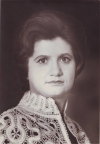
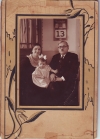
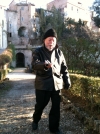
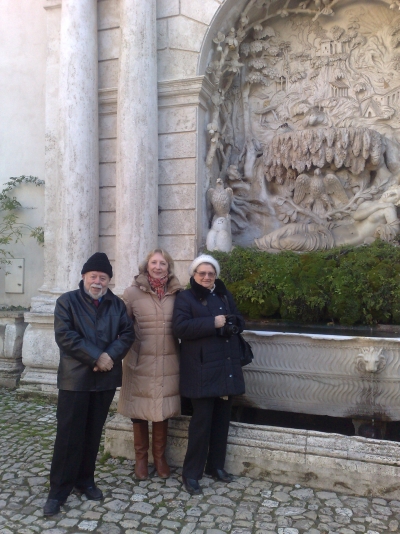
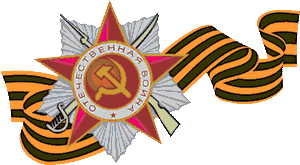
Посетители, находящиеся в группе Гости, не могут оставлять комментарии к данной публикации.